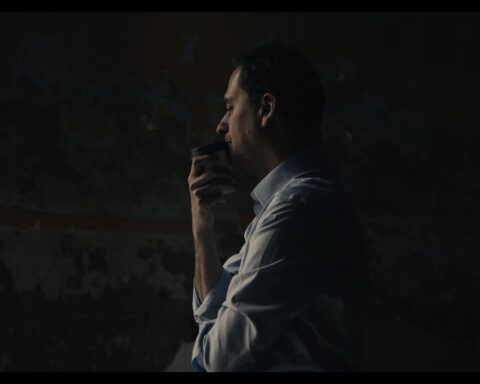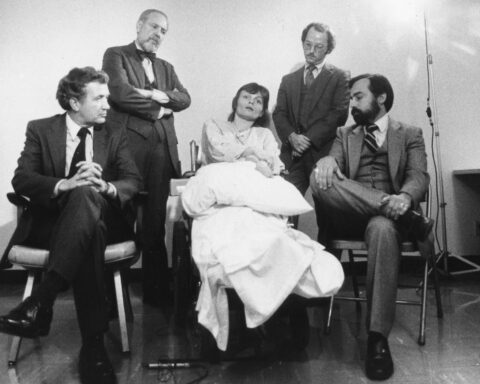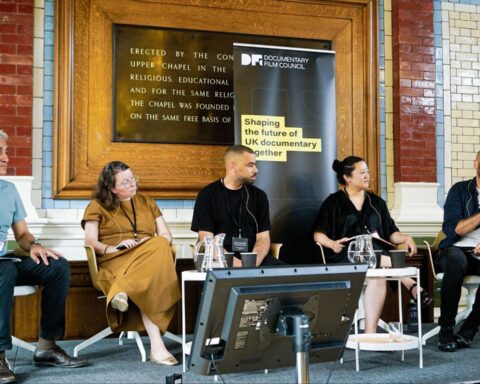The 13th edition of DOC NYC starts today, November 9, and will run in Manhattan theatres through the 17th. After that, the largest documentary event in the United States will continue online until November 27, making the majority of the films accessible for three weeks. DOC NYC has fully returned to cinemas as well as continuing online is welcome for both audiences and professionals who have been isolated for all too long.
This year’s festival is the first under new artistic director Jaie Laplante, who replaces DOC NYC founding curator Thom Powers. Laplante, a veteran with over two decades of festival experience including a dozen years at the Miami Film Festival, heads up a team of nine other programmers while Powers has moved on to be director of special projects. Remaining as Executive Director is Raphaela Neihausen.
For those who are able to attend DOC NYC in person, the locations are significant as they’re in downtown Manhattan, an area that has certainly sprung back into life. The principal location is at the IFC Center, on Sixth Avenue at West Third Street, in Greenwich Village, a lovely historic spot that used to house the Waverly, and offers excellent screening spaces. The other two venues are nearby, in Chelsea, at the School of Visual Arts Theatre (on 333 West 23rd street, between 8th and 9th Avenues) and at Cinépolis Chelsea (on 260 W 23rd St, between 7th and 8th Avenues).
This year’s DOC NYC features 110 feature-length documentaries among over 200 films and events. There will be 29 World Premieres and 27 US premieres with most festival films available digitally to US viewers. POV’s publisher Pat Mullen and editor Marc Glassman are pleased to preview a number of the films being shown at DOC NYC for our Canadian and international readership. We’re offering brief descriptions of many selections in two of their featured programs, the Short List and Winner’s Circle as well as an overview from one of the festival’s themes, Voices of Canada. Pat and Marc have also put on their curator’s hats to highlight other films at DOC NYC, grouping them under relevant themes. –Marc Glassman
Top Docs: Short List
All that Breathes
(dir. Shaunak Sen)
This visually stunning film is the first doc to win both the Grand Jury Prize at Sundance and the l’Œil d’Or at Cannes. It’s easy to see why. The film poetically observes two brothers at a New Delhi bird clinic who care for carnivorous birds called Black Kites. Their mission has stirring parallels to the social divides in the film’s backdrop. Read our review from Sundance.
All the Beauty and the Bloodshed
(dir. Laura Poitras)
Winner of the Golden Lion at the Venice Film Festival, Laura Poitras’s doc follows photographer Nan Goldin as she wages a campaign to hold the Sackler family accountable for profiteering amid the opioid crisis. The film finds the perfect marriage of art and activism as Poitras weaves Goldin’s family story and oeuvre within a larger tale of accountability. It’s been 30 years since a director (Barbara Kopple) won her second Oscar in the doc category – can Poitras pull the same feat above her DOC NYC Short List cohorts? Read our review from TIFF.
Beba
(dir. Rebeca Huntt)
Love it or hate it, it’s hard to deny that Beba marks a confident debut for Rebeca Huntt. The film is a take-no-prisoners celebration of the self that’s equal parts beauty and bloodshed. Try to spot the scenes that are staged: more context might serve Huntt’s friends and family better, but this is one film you’ll want to see with a Q&A. Read more in our interview with Huntt.
Descendant
(dir. Margaret Brown)
Winner of a special prize at Sundance, Descendant is Netflix’s top big in the Oscar race after winning the category three times in the last four years. The film examines the history of the slave ship Clotilda arrived in America just after the importation of slaves was declared a capital crime. Director Margaret Brown mines the USA’s history of slavery and erasure as she traces the family tree of these last slaves. Read our review from Sundance.
Fire of Love
(dir. Sara Dosa)
Fire of Love is to volcanoes what Adaptation. is to orchids. Director Sara Dosa beautifully tells the love story of Maurice and Katia Krafft and their shared fascination with volcanoes. Drawing upon the Kraffts’ extensive archive of films they shot amid their research, Fire of Love is an epic tale about caring about something so passionately that it draws one to the ends of the Earth. Read more in our interview with Dosa and an essay on elements and archives.
The Janes
(dir. Tia Lessin and Emma Pildes)
This talking heads doc couldn’t arrive at a better moment. The women of “The Janes” share the history of the underground network that helped others receive abortions when they were illegal. The film illuminates the story behind the recent drama Call Jane, but lets the figures who were at the front lines of the fight for reproductive rights to tell the history in their own words. Read our review from Sundance.
Last Flight Home
(dir. Ondi Timoner)
Director Ondi Timoner captures the end-of-life process with piercing intimacy. This film shares the final days of her father’s life as the Timoner family gathers to honour his wish to die with dignity. Timoner captures the heartbreak and hardships of this difficult decision, especially amid a pandemic, but also the beauty of being able to say goodbye before it’s too late. Read our review from Sundance.
Louis Armstrong’s Black & Blues
(dir. Sacha Jenkins)
If you’ve been calling him “Louie” Armstrong all these years, Black & Blues helps set the record straight. This portrait of jazz icon Louis Armstrong hits all the right notes as it mines the archives to capture his life’s story. Director Sacha Jenkins salutes the trumpeter’s legacy as a Black artist who broke through the colour barrier, but also confronts charges that Armstrong perpetuated tired stereotypes. Read our review from TIFF here.
Mija
(dir. Isabel Castro)
Mija tells a new kind of immigration story, narrowing in on the experiences and expectations of Mexican immigrant daughters in the United States. The film follows Doris Muñoz, a daughter of Mexican immigrants thrust into the big leagues as a music manager, as she hangs her family’s future on a precarious creative industry. It’s a tale of dreams and the burden of trying to achieve them. Read our review from Sundance here.
Moonage Daydream
(dir. Brett Morgen)
This amped-up and plugged-in rockumentary turns the music doc up to 11. Director Brett Morgen offers a truly unconventional portrait of iconic rocker David Bowie, drawing upon a kaleidoscopic range of archives to explore the facets of the musician’s persona. Moonage Daydream must be seen on the largest screen possible with the music blaring as obnoxiously loud as it will go. Read our review from Cannes and interview with Brett Morgen.
Navalny
(dir. Daniel Roher)
Toronto homeboy Daniel Roher takes a giant leap forward with this portrait of Russian opposition leader and political prisoner Alexei Navalny. The film gains extraordinary access to the politician as he investigates the attempted assassination on his life and puts his story on the record before returning home to Russia to face his inevitable persecution. It’s a thrilling snapshot of history in the making. Read our review from Sundance and our interview with Daniel Roher.
Retrograde
(dir. Matthew Heineman)
Prolific director Matthew Heineman (City of Ghosts, Cartel Land) goes to the front lines of the USA’s withdrawal of troops from Afghanistan. Retrograde captures the story of a conflict twenty years in the making. The film observes American Green Berets and the Afghan officers who will continue the mission to protect the homeland as the U.S. troops move out. The film’s been a hit on the U.S. festival circuit this year.
The Return of Tanya Tucker Featuring Brandi Carlile
(dir. Kathlyn Horan)
This doc observes the return of Tanya Tucker and, yes, it features Brandi Carlile. The title says it all, but there’s obviously more to it. This doc is a loving portrait of two generations of women making beautiful music together. It observes as one steps back into the spotlight and grows thanks to one of the many young artists she’s inspired. The music’s swell, too. Read our interview from TIFF.
“Sr.”
(dir. Chris Smith)
After tackling the world of movies in works like American Movie and Jim & Andy: The Great Beyond, director Chris Smith offers a loving portrait of late actor and filmmaker Robert Downey, Sr. The doc, which has yet to screen in Canada, was a hit at Telluride and the New York Film Festival, thanks to its portrait of film and family featuring Paul Thomas Anderson, Norman Lear, and Sr.’s famous son, Robert Downey, Jr.
The Territory
(dir. Alex Pritz)
Every director who wonders how to approach a story about a culture that is not one’s own should see The Territory. This Sundance winner is a brilliant feat of collaborative filmmaking as director Alex Pritz works with members of the Uru-eu-wau-wau tribe to tell their story about the fight to save the Brazilian Amazon. The partnership opens the story to a multitude of perspectives and opportunities for immediate first-hand footage. Read more in our review from Sundance and interview with Alex Pritz.
Top Docs: Winners’ Circle
2nd Chance
(dir. Ramin Bahrani)
No stranger to the notion that truth can be weirder than fiction, Ramin Bahrani (Chop Shop, 99 Homes) delivers his first feature documentary with this novel portrait of Richard Davis, the inventor of bullet-proof vests. Bahrani finds a great character for the books as his unreliable subject spins yarn upon yarn, which inspires the director to dig deeper. He finds an American tragedy about winners and losers in a rigged game. Read our review from Sundance and check back for an interview with Bahrani.
Aftershock
(dir. Paula Eiselt and Tonya Lewis Lee)
This Sundance winner offers a fierce rallying cry, “Black wombs matter!” The doc probes the history of America’s health system and the legacy of slavery that is linked to the rise in caesarian births that are killing Black women in troubling numbers. The film follows widowers and bereaved grandparents as they advocate for the rights of future mothers. It’s tough, compelling filmmaking. Read our review from Sundance.
Bad Axe
(dir. David Siev)
Toronto audiences can catch Bad Axe at Reel Asian as it continues its festival run, but the slot in DOC NYC’s Winners’ Circle section shows how much this family portrait is touching audiences across the circuit. The film is a poignant pandemic story in which Siev chronicles the anti-Asian racism his family experienced when he returned to their small hometown of Bad Axe, Michigan during the early days of lockdown. Read more in our review of the film.
Freedom on Fire: Ukraine’s Fight for Freedom
(dir. Evgeny Afineevsky)
Seven years ago, Winter on Fire: Ukraine’s Fight for Freedom gripped audiences with its incendiary portrait of the Maiden Revolution and pro-democracy movement in Ukraine. Cut to 2022, and the world is glued to news from Ukraine as it defends itself against a Russian invasion. Director Evgeny Afineevsky once again provides an immediate account from the thick of the action and shares stories from the front lines of a nation’s courage.
A House Made of Splinters
(dir. Simon Lereng Wilmont)
Winner of the Best Director prize in the World Cinema competition at Sundance this year, Simon Lereng Wilmont follows his acclaimed doc The Distant Barking of Dogs with this touching portrait of children “orphaned” by the war in Ukraine. The film is observational cinema at its best as the cameras observe children whose parents can no longer care for them due to addiction and PTSD. It’s a surprisingly hopeful work, however, amid a bleak situation. Read our review from Sundance.
I Didn’t See You There
(dir. Reid Davenport)
Do a “Sundance Best Director winner” double bill with A House Made of Splinters and this doc that scooped the prize in the U.S. competition. Reid Davenport’s groundbreaking feature I Didn’t See You There captures the Bay Area of San Francisco from the vantage point of his wheelchair as he whirs around the city and considers issues of access and mobility beneath the shadow of a carnival tent that looms ominously around him. Read more in our interview with Davenport.
In Her Hands
(dir. Tamana Ayazi, Marcel Mettelsiefen)
This film, executive produced by Hillary Clinton and Chelsea Clinton, offers a character piece about Zarifa Ghafari, who was elected mayor of Maida Shar, Afghanistan at 26 years old. Her outspokenness as a progressive young woman puts her in a precarious situation as the Taliban rises while the American troops prepare to withdraw. Recommended especially for fans of He Named Me Malala and On Her Shoulders. Read our review from TIFF and check back for an interview with Tamana Ayazi and Marcel Mettelsiefen.
Riotsville, USA
(dir. Sierra Pettengill)
As America burned amid the social revolutions of the 1960s, the military started a fire of its own by creating mock cities with staged riots that served as a training ground—or, more accurately, stomping ground—for civilian and military police to learn how to deal with protesters. Jaw-dropping archival footage creates a perceptive interplay between the events that sparked protest and the ways in which the establishment perceived them. The contemporary resonance brings chills. Read more in our review from Sundance.
POV Picks for DOC NYC by Theme
Voices of Canada
Big Fight in Little Chinatown
(dir. Karen Cho)
It may be gentrification or it might be anti-Asian prejudice but something truly disturbing is happening in Chinatowns across North America. Whether in Canada’s Montreal, Toronto and Vancouver or the U.S.’ New York and San Francisco, historic Chinese communities are finding their neighbourhoods threatened. Cho talks to academics and community leaders to hear about the issues that are besieging this continent’s Chinatowns.
Buffy Sainte-Marie: Carry It On
(dir. Madison Thomas)
This year’s Directors Guild of Canada award-winner for best documentary, Madison Thomas’s film profiles a true musical and Indigenous icon. From the Sixties, when she was a folk singing phenom to her recent high energy tour, Buffy Sainte-Marie has been a brilliant performer and musician. As a composer, she won an Oscar for “Up Where We Belong,” and affected a generation with “The Universal Soldier.” Thomas covers it all, especially Sainte-Marie’s advocacy for Indigenous rights, which got her blacklisted from radio for decades. Read more in our cover story on the film.
Cabin Music
(dir. James Carson)
Pianist and filmmaker James Carson has been merging his music with the natural world for decades. It took the classically trained musician away from the conservatory route, which started for him as a youth in Alberta, and put him on a long journey of self-exploration. His Cabin Music is a true artistic endeavour, capturing free form beautifully played piano music with the dance he perceives in the movement of people and, above all, birds. To say the least, this is not a standard doc but it is one that is made with sensitivity and perception.
Category: Woman
(dir. Phyllis Ellis)
Who is a woman? World Athletics, a regulatory body that decides who competes in the Olympics and other high profile athletic events around the world, has disqualified many competitors because they don’t match their arbitrary standards. Director Ellis, a former Olympian, focuses on athletes such as South African Caster Semenya and Ugandan Annet Negesa, who had their lives tragically transformed by World Athletics. At a time when transgender athletes are on the rise, Ellis’ doc couldn’t be more relevant. Read more in our review from Hot Docs.
Hunting in Packs
(dir. Chloe Sosa-Sims)
Women in the political circus—British Labour Party member Jess Phillips, American Democrat Pramila Jayapal, and Canadian Conservative MP Michelle Rempel Garner—fuel this three-pronged portrait of the gender divide in politics. A controversial Calgarian like Rempel Garner might not be the ideal figure to spotlight in a series called “Voices of Canada” at DOC YC, but even a lefty film critic can appreciate how Chloe Sosa-Sims captures her fight without necessarily endorsing her politics. Read our review from Hot Docs.
Love in the Time of Fentanyl
(dir. Colin Askey)
This sobering slice of cinema vérité takes audiences inside the Overdose Prevention Society in Vancouver’s East Side where devoted citizens endeavour to save lives amid the rampant opioid crisis. The film, which plays in the American competition, observes the role of harm reduction and safe injection sites as it invites audiences to consider addiction and mental health through an empathetic lens. Read more in our interview with director Colin Askey.
Queen of the Deuce
(dir. Valerie Kontakos)
It’s an unexpected pick for the Voices of Canada stream at DOC NYC, but this doc might be the state of Canadian film in a nutshell. This Canadian-Greek co-production, directed by American filmmaker Valerie Kontakos and produced by Canuck Ed Barreveld (The League of Exotique Dancers) and Greek producer Despina Pavlaki chronicles the extraordinary life of Greek ex-pat Chelly Wilson, who built a dynasty of porn theatres in New York City. Much of the Canadian film scene has roots in smut (thanks, Quebec!), so there are appropriate parallels in this fun Canadian-ish tale.
Arts Stories
Ellis
(dir. Sascha Just)
Ellis Marsalis is far more than the father of the world famous jazz giants Wynford and Branford Marsalis and their less famous but prodigious musician brethren Jason and Delfeayo. Ellis was a pianist, band leader, composer, accompanist and, above all, musical teacher. Just profiles a New Orleans legend who worked with such legends as Nat and Cannonball Adderley and Ed Blackwell and mentored musicians Terence Blanchard, Harry Connick, Jr and Marlon Jordan. The film gives a glimpse not only into Ellis Marsalis’ life but also New Orleans, where he could work, even during times of great racial prejudice, and make an impact in universities and creative arts centers as well as clubs and recording studios.
The Hamlet Syndrome
(dir. Elwira Niewiera, Piotr Roslowski)
Filmed just before Russia’s invasion of Ukraine, this prescient and challenging film follows a group of young actors as they prep for a play based on the character of Hamlet. Filled with bold improvisations, The Hamlet Syndrome negotiates the intersection between life and art to create a work with intense psychological resonance. Shot in an appropriately loose and mercurial fashion, the film captures the ambiguous nature of Shakespeare’s most modern character and thrusts him into a modern political discourse.
Sam Now
(dir. Reed Harkness)
Sam Now is a mystery story, most of which is based on psychology rather than detection. It’s beautifully put together with a quietly intimate approach to its complex narrative, rendered through an astonishingly rich archive of Super-8 and home-video material shot by Reed of his brother and their disjointed, likeable family over 25 years. Harkness’s film is a joy to watch in part because it doesn’t wear its artistry on its sleeve but make no mistake: this is a film of depth, which ultimately investigates trauma. Read more in our review from Hot Docs.
In the Company of Rose
(dir. James Lapine)
Theatre director James Lapine (Into the Woods) offers a portrait of poet and human rights activist Rose Styron in this feature doc, which world premieres at DOC NYC. Filmed over six years, the doc covers Rose’s life and career, along with her marriage to late author William Styron of Sophie’s Choice fame. Covering stories of poetry, love, family, art, addiction, and heartbreak, Rose’s story promises to engage audiences who long for the lost art of conversation.
Ennio
(dir. Giuseppe Tornatore)
Academy Award winner Giuseppe Tornatore pays tribute to composer Ennio Morricone, who scored many of his films including The Legend of 1900, Malèna, and the Oscar winner Cinema Paradiso. This expansive doc features a who’s-who of A-list directors who reflect upon Morricone’s notable contribution to film music with scores for movies such as The Good, the Bad, and the Ugly, Bugsy, and The Untouchables. Full disclosure: POV’s Pat Mullen was on the jury at Toronto’s Lavazza Italian Contemporary Film Festival, which awarded it the critics’ prize!
Headliners
Cirque du Soleil: Without a Net
(dir. Dawn Porter)
When COVID hit, the Quebec based entertainment giant had to close its 44 shows around the world, lay off over 4500 employees and seek bankruptcy protection. Over a year later, the refinanced circus operation was finally able to relaunch productions in Las Vegas. Porter’s film concentrates on “O,” a spectacle set above water (“eau,” of course, means water in French). Using a deadline structure, counting off the weeks before the show returns to public viewing, the doc offers a multitude of character studies of some of the unique performers who make Cirque such a fascinating institution.
The Conspiracy
(dir. Maxim Pozdorovkin
We can’t report on the latest doc from Russian director Maxim Pozdorovkin (Pussy Riot: A Punk Prayer, Our New President) until after its world premiere in the festival’s closing night slot, but audiences can rely upon the provocative director to mine the world of spin doctors, populist politics, and headlines-in-the-making for a compelling tale. This time, Pozdorovkin sets his sights on anti-Semitism and asks why everybody always blames the Jews when something bad happens?
Gumbo Coalition
(dir. Barbara Kopple)
POV hasn’t had a chance to see Gumbo Coalition yet, but the doc, which screens as a Centrepiece selection, features one of the biggest names world premiering at DOC NYC. Two-time Academy Award winner Barbara Kopple (Harlan County, USA; American Dream) returns to the festival with this snapshot of contemporary American politics. The doc follows two political activists as they mobilize Americans to wake up to the resurgence of systemic racism in Trump-era America.
Maya and the Wave
(dir. Stephanie Johnes)
DOC NYC has an opening night selection that ensures audiences will ride a wave of girl power into the festival. Stephanie Johnes offers an exhilarating portrait of big wave surfer Maya Gabeira as she sets her eyes on a Guinness world record. The film includes gripping footage of Gabeira crashing amid titanic waves and getting back up, but even more inspiring is how she refuses to be crushed by rampant sexism and instead lets her critics fuel her hunger to fight for women’s place in extreme sports. Read our review from TIFF and interview with Stephanie Johnes.
Political Animals
How to Save a Dead Friend
(dir. Marusya Syroechkovskaya)
What is the emotional and psychological burden of being a young person in Putin’s Russia? Marusya Syroechkovskaya turns her camera back upon herself as she observes her relationship with her boyfriend Kimi as they dabble in drugs during their teen years and dance upon the brink of self-destruction. This film observes as Syroechkovskaya makes a conscious choice to defy her leader by pulling herself out of the despair she experiences—and hopefully her friend as well. Read more in our review of the film.
January 6th
(dir. Gédéon Naudet, Jules Naudet)
Is it too soon to revisit the events of January 6? This timely film examines the insurgency that Donald Trump sparked upon the Washington Capitol when he and his army of Proud Boys refused to accept the results of the 2020 election. Featuring interviews with figures like Nancy Pelosi and Liz Cheney, the film investigates the violent uprising that shocked the world.
Jerry Brown: The Disrupter
(dir. Marina Zenovich)
Does Jerry Brown represent hope for America, or is he a headache? Director Marina Zenovich (Roman Polanski: Wanted and Desired, Robin Williams: Come Inside My Mind) profiles the indefatigable man of American politics. This doc portrait chronicles Brown’s two-time tenure as Governor of California, his coup holding all stripes of political offices, and his efforts to conquer everything from the White House to Linda Ronstadt’s heart. Spoiler alert: he won neither.
All the News that’s Fit to Print
The Grab
(dir. Gabriela Cowperthwaite)
This environmental thriller pulses with journalistic rigour at Blackfish director Gabriela Cowperthwaite follows investigative reporter Nathan Halverson as he digs into an alarming environmental crisis with global costs. The film connects all the dots between land grabs, in which wealthy countries snap up foreign land, and human rights concerns worldwide, from skyrocketing food prices to outbreaks of war. Read more in our interview with Cowperthwaite ad Halverson.
The Killing of a Journalist
(dir. Matt Sarnecki)
This gripping Dutch/Czech true crime story unpacks the murders of Slovak investigative journalist Ján Kuciak and his fiancée Martina Kušnírová, who were brutally killed in their home. Director Matt Sarnecki traces the story back to powerful figures in the political and judicial systems. As the crime reveals a rigged system, the story explodes as citizens rightfully take to the streets. The film is top-notch investigative work in the vein of docs like Collective. Read our review from Hot Docs here.
While We Watched
(dir. Vinay Shukla)
In these days when journalists are under attack everywhere in the world, India’s Ravish Kumar is heroic in his dedication to the field he’s been operating for decades. Shukla documents the veteran executive editor at NDTV as he covers controversial events in his country, which is growing increasingly violent under the radical exclusionary Hindu regime of Narendra Modi. Contrasting NDTV’s clear-eyed approach with rivals who have caved into Modi’s rhetoric, While We Watched shows how the media can be manipulated in democracies and how important it is for journalists like Kumar to remain diligent in the pursuit of their roles. Read more in our review from TIFF.
Queer Stories
1946: The Mistranslation that Shifted a Culture
(dir. Sharon “Rocky” Roggio)
What is the origin of the Catholic Church’s complicated stance towards queer people? Director Sharon “Rocky” Roggio takes a personal approach to this query by unpacking the ways in which scripture changed over time. Joining forces with other seekers, she finds the story behind why “homosexuality” didn’t appear in the Bible until 1946 and connects with queer people who love the church even though it openly doesn’t love them.
Casa Susanna
(dir. Sébastien Lifshitz)
Screening in the International Competition of DOC NYC following its debut at TIFF, Casa Susanna brings a wonderfully told tale of a small camp in the Catskills that provided a safe haven for transgender people in the 1960s. As the film gives voice to surviving members of the community, they share how Casa Susanna helped them navigate their identities at a time when homosexuality was illegal and “transgender” was barely a word on anyone’s tongue. Read more in our review from TIFF.
Santa Camp
(dir. Nick Sweeney)
Jolly old Saint Nicholas is a figure beloved by many, but who decided that the symbol of Christmas cheer was an old white guy? Santa Camp observes what happens when a few aspiring Santas challenge the status quo image of Kris Kringle. Whether the camp counsellors decide to play naughty or nice is one thing that audiences will have to wait and see—and whether the parents in shopping malls accept them is another.
Holy Herzog!
Theatre of Thought
(dir. Werner Herzog)
The introspective Bavarian director always has something simmering on his noodle, so it’s appropriate that he’s finally looking deep into the most inquisitive force of all: the brain. Theatre of Thought follows Herzog as he converses convivially with scientists to learn more about this computer we all carry. While it’s not Herzog’s most cinematic work, it nevertheless displays his signature philosophical grandeur. Read more in our review from TIFF.
The Fire Within: A Requiem for Maurice and Katia Krafft
(dir. Werner Herzog)
While Sara Dosa has made a hit doc telling the untimely story of the daredevil volcanologists, the Krafft couple, it is clearly a subject made for the intrepid Herzog. Using brilliant footage shot by the Kraffts as did Dosa, what Herzog is able to contribute is his voice and ruminations on their tale. It’s his unique take, and makes intriguing viewing, especially for those fascinated by the German director.














